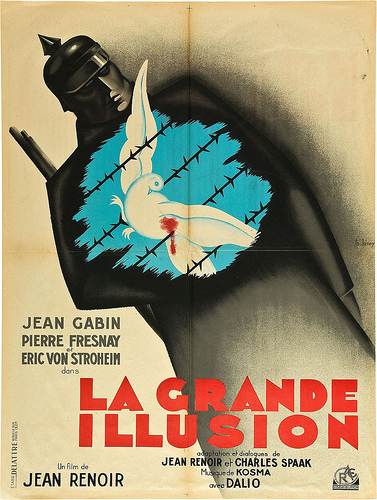Movies With Staying Power? Grand Illusion Is The Real Deal
By Steven Pate in Arts & Entertainment on Jun 29, 2012 7:00PM
 Memo to Mayor Emanuel: we know that whole G8 thing came, went and passed our fair city by altogether. Sorry that didn't work out as you hoped, but we have an idea for you: Why not invite François Hollande and Angela Merkel to the Siskel Film Center this weekend? Sure it will be a bit hot outside compared to Brussels, but the A/C in the theater works just fine and on the screen you'll find not just one of the most enjoyable films ever made, but also the perfect cinematic prop for a "teachable moment:" Grand Illusion.
Memo to Mayor Emanuel: we know that whole G8 thing came, went and passed our fair city by altogether. Sorry that didn't work out as you hoped, but we have an idea for you: Why not invite François Hollande and Angela Merkel to the Siskel Film Center this weekend? Sure it will be a bit hot outside compared to Brussels, but the A/C in the theater works just fine and on the screen you'll find not just one of the most enjoyable films ever made, but also the perfect cinematic prop for a "teachable moment:" Grand Illusion.
Grand Illusion's place among the most cherished anti-war films in cinema history was secured when Joseph Goebbels named it "Cinematic Public Enemy No. 1" and President Franklin Roosevelt insisted that "all the democracies in the word must see [it]." The first foreign film to receive an Academy Award nomination for Best Picture, Orson Welles famously declared that if he could save any single film on Earth from destruction, this would be it. It's a consensus classic. So what's so relevant about a World War I P.O.W. escape movie at this moment?
The title-as pedantic cinephiles have been all-too-happy to point out for 75 years now-would be better rendered "The Great Illusion," after the book of that precise title by the English Nobel Laureate Norman Angell which inspired it. The thesis of that 1913 text, that the deep interdependence among modern European states means that war between them could no longer serve any party's interest (even that of the victors), was just a couple of world wars ahead of its time: Angell's great illusion vexes us even today. Insofar as the specter of the Weimar-era hyperinflation, which followed the Treaty of Versailles and was instrumental in Hitler's rise to power, still haunts Germany, the conflict Grand illusion portrays may still be said to dictate the limits of cooperation among European nations.
For all the sociopolitical baggage we want to strap on its back, Grand Illusion is just as weightless and fresh today as ever. Working class mechanic turned pilot Lieutenant Maréchal and upper crust career officer Captain de Boeldieu are shot down in enemy territory and sent to a P.O.W. camp. Just when they are on the brink of tunneling their way to freedom, they are relocated to a less pregnable fortress, run by the aristocratic Major von Rauffenstein. Maréchal and fellow prisoner Lieutenant Rosenthal manage escape thanks to Boeldieu's heroics, are sheltered by a German farm woman, at her great peril, and eventually cross the border to ultimate freedom.
No single paragraph of plot summary can do justice to the nuances of character achieved by Renoir and Charles Spaak's script or to the array of warm-blooded performances that make the film so endlessly watchable. The word that pops up in most discussions of the film is "humanism:" Renoir is sincere and sympathetic in his portrayal of individuals transcending all manner of differences: political, socio-economic, ethnic, and generational. The charismatic Jean Gabin as Maréchal and Erich von Stroheim's starched, monocled and white-gloved von Rauffenstein deserve their top billing, but the film is littered with memorable roles and unforgettable moments of great humor, from the P.O.W. camp vaudeville routines to a young girl's declaration, when faced with a nativity scene humbly fashioned from potatoes, that she "wants to eat Jesus."
The Nazis confiscated every print and negative of Grand Illusion after invading of France, and and then butchered it to fit their needs. A 1942 raid by Allied forced destroyed the lab outside Paris where it was believed to reside, but the negative had in fact been shipped to Berlin. The Reichsfilmarchiv which possessed it then fell in the Russian Zone after the city was partitioned, and the believed-lost film was taken Moscow by the Red Army. A true restoration using the original film was not undertaken until 1997, and this new 4K digitization of the masterpiece, with revised subtitles and cleaned-up audio, promises to be revelatory. A film that speaks powerfully to the human condition and whose relevance remains undaunted after 75 years, Grand Illusion, properly titled or not, is not to be missed.
Grand Illusion opens tonight for a week-long run at the Siskel Film Center, 164 N. State Street.